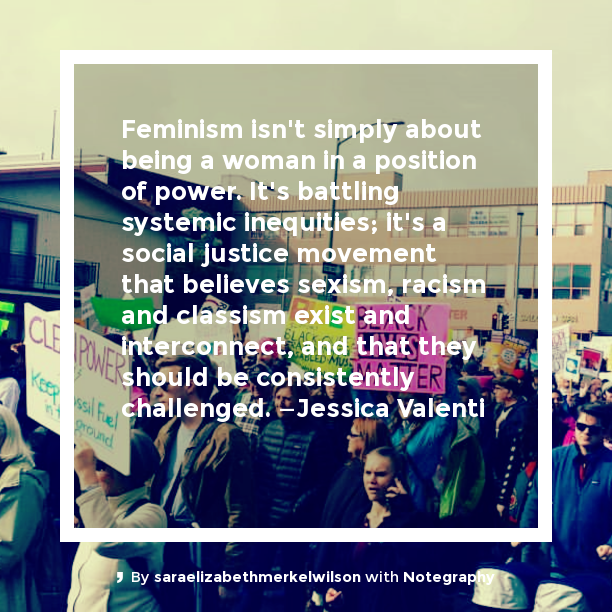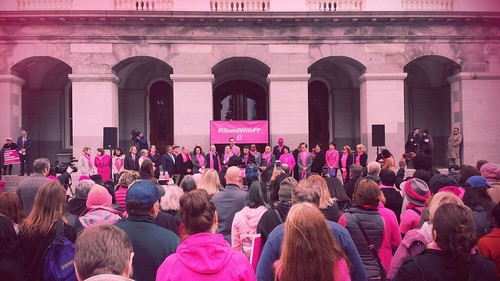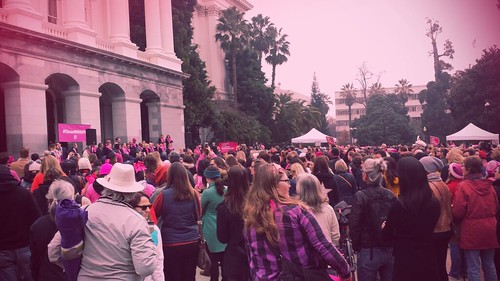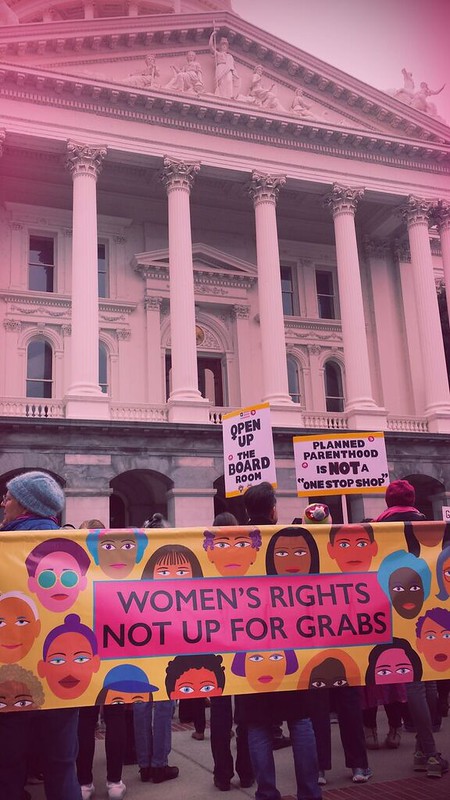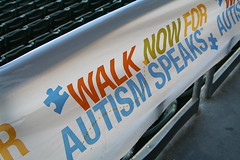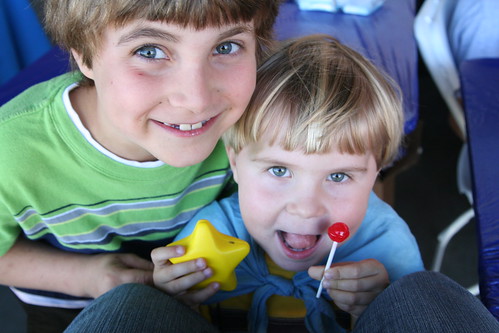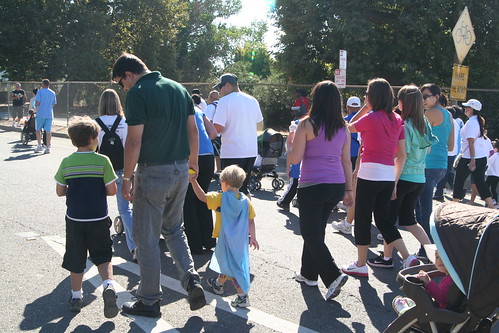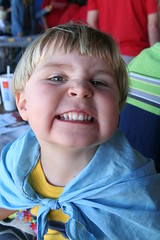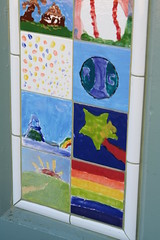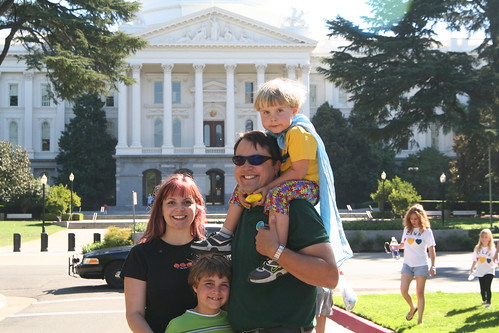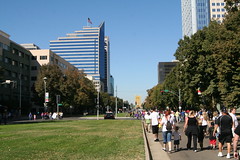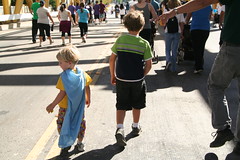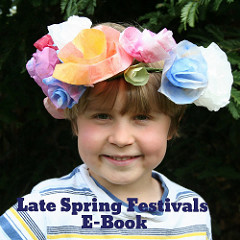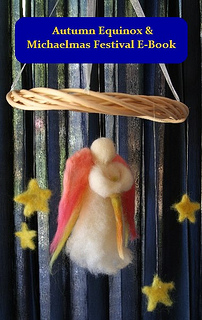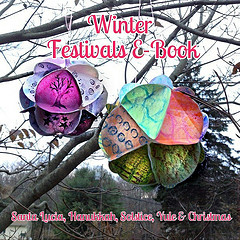A while ago I alluded to my recent crisis. The “crisis” turned out not to be one, so rest easy. I want to write about it because … well … because I learned stuff that other people might want to know.
I was recently sick with a cold; you may remember my bitching about it. The cold seemed to go away, then returned and settled in my lungs as a respiratory infection. This is what colds do in my body. It’s tradition. I relented and went to see my doctor, Dr. Chen on a Monday morning, now two weeks ago.
Chen confirmed that I had an infection in my lungs, confirmed that this is indeed what colds turn into in people like me—people with chronic asthma and allergies. Right. I knew that. Chen listened to my breathing and exclaimed “You’re really wheezing bad!” Right. I knew that, too. She prescribed two medications for me: prednisone (a corticosteroid) and Zithromax (a brand name for azithromycin, which is an antibiotic).
Then she told me I would have to stop breastfeeding Asher and “pump and dump.” I am beginning to think that this phrase is a favorite among physicians everywhere. I expressed my dismay about this, and she launched into a discussion about how these two drugs are needed to make me better—that I would NOT get better without them—and that surely I don’t want these drugs to go into my milk and into my baby.
Right. No, I wouldn’t want that.
So, I left Chen’s office and drove directly to the pharmacy at Raley’s. I shopped for a few items while waiting for the pharmacy people to fill the scripts. While I shopped, I got more and more upset. I put a can of Earth’s Best organic baby formula in my cart and tried to imagine Asher happily taking a bottle. Or a cup. Or anything other than mama milk at bedtime. I bought the drugs, bought my other items, and came home. By the time I got home, I was crying.
Ian had been watching the boys for me while I went to the doctor’s office. He was naturally alarmed by my tears. We sent Lucas out into the backyard so I could fall apart and tell Ian what was wrong. I sobbed as I told him how I didn’t want to take the meds. I did not want to stop breastfeeding. I felt that Asher was old enough now that there was a serious chance that if I stopped nursing him, he would wean. Nursing is a beautiful symbiotic relationship: My body makes enough milk to meet the demand of my nursling. Without the demand, the body stops making milk.
I was looking at taking seven days’ worth of drugs, plus two more days of dumping my milk and using formula “just to be sure.”
Asher gets a good portion of his nutrients from “real” food now, or from purées. But he still nurses at least six to eight times in 24 hours. At this time, Asher was still sick with the same cold I had had, and was feeling miserable, and was therefore nursing for comfort and more often than usual. Even though he might be physically able to wean without a huge negative nutritional consequence, he is still very much a baby. Or a toddler, if you will. Both the World Health Organization and the American Academy of Pediatrics recommend continued breastfeeding until the age of two. Studies show that the immunity benefits of breastfeeding change as the baby grows. Some immune factors decrease, but some increase: Lysozyme, an immune factor that attacks the cell walls of bacteria and kills them, is present in greater concentrations after the first year than before.
Breastfeeding Asher is crucial to me for a lot of reasons. When he was first born and I got so shockingly sick with a uterine infection and then septicemia, my milk did not “come in.” In the hospital, they had me on something like ten different drugs to combat the infection and save my life (three different antibiotics—Flagyl, Levaquin, Vancomycin—steroids, an anticlotting drug called argatroban, two asthma drugs, potassium chloride, phosphorus, insulin, mucomyst (a drug I was told was supposed to protect my kidneys from all the other drugs they were giving me), guaifenesin, dilaudid as needed for pain, and Xanax).
It was only through great effort and single-minded determination that I eventually became able to breastfeed my infant: I had to pump every three hours around the clock for weeks. Following doctors’ instructions, I had to dump out my milk for six weeks before I was allowed to feed my baby my milk.
So here’s where I wax poetic. We need to breastfeed. Both of us. It is our primary and primal form of communication. It is a panacea for all hurts, fears, insecurities, and worries. It makes us sleepy. It makes us feel peaceful, in harmony with each other, and safe. Breastfeeding my baby makes me feel worthy—that I am a good mother. It increases the happy hormones in my bloodstream, and helps me stay patient when faced with the many frustrations of raising small children. It burns calories that I would find difficult to burn otherwise, given my circumscribed (read: housebound) activity. It provides him with perfect, tailor-made nourishment and protects him from all sorts of health problems. It also protects me from future health problems such as osteoporosis and possibly even breast, ovarian, and uterine cancers. Nursing is the perfect start to every day, the perfect way to drift off to sleep, the perfect way to reunite after an absence. It is our special time together, our unique bond. We are not ready to give it up.
My doctor’s recommendation that I stop breastfeeding and “pump and dump” was greatly disturbing. It threw me into a panic and dredged up all sorts of terrible feelings that were born in my illness last year. It churned a lot of dark, gloopy fears around and threw them back in my face to be felt all over again.
Ian talked me down a bit. We discussed my not taking the drugs. But I was sick and felt very ill. Not breathing properly sucks, by the way. I wanted to feel better. But I didn’t want to stop breastfeeding Asher.
We turned, as we often do, to the Internet and to books. I spent an entire afternoon researching online and flipping through some books on breastfeeding that I have. And for those of you who might still be reading, here’s what I found:
You do not have to stop breastfeeding when taking MOST medications.
Doctors have an incomplete understanding of lactation and medications. Drug studies are not done on nursing mothers or babies, therefore little hard evidence exists to prove that continued nursing when taking meds is safe. Serious research on breastfeeding and the nature of breast milk has only been done in the last 20 years. Therefore, to the established medical field, breastfeeding while taking medications is not safe. To the drug companies, it’s less risky simply to say “ask your doctor” or “don’t take while breastfeeding.” They avoid lawsuits that way. Same with the doctor. I gather from what I’ve read that very little time is spent on lactation in medical school, so doctors who may even be pro-breastfeeding don’t really know much about it. They take the conservative stance, as my doctor did: Don’t breastfeed while taking meds.
But, two of the biggest experts in lactation and breastfeeding, both MDs, say most medications are fine to take while continuing breastfeeding your baby. Only a very small percentage of most drugs makes it into breast milk, usually less than 1%.
Tom Hale, MD, (a lactation and drug specialist and author of Drugs and Mother’s Milk, 13th ed., and Drug Therapy and Breastfeeding), Jack Newman, MD, (researcher and author of The Ultimate Breastfeeding Book of Answers) and the American Academy of Pediatrics (AMERICAN ACADEMY OF PEDIATRICS: The Transfer of Drugs and Other Chemicals Into Human Milk) all say its OK to breastfeed even when taking these specific drugs (prednisone and azithromycin) and not to worry about baby. The 2001 AAP publication (Table 7) says there is “no reported signs or symptoms in infant or effect on lactation.”
In fact, there are lots of medications that are safe to take while breastfeeding, but your doctor may not know that. Whether a medication is safe to take depends on a number of things, such as:
* maternal serum drug concentration
* whether the drug is absorbed through the gut; many medications are delivered in other ways, therefore almost none enters the milk
* whether the medication binds to protein
* the size of the drug’s molecules (“In the early postpartum period, large gaps between the mammary alveolar cells allow many medications to pass through this milk that may not be able to enter mature milk. These gaps close by the second week of lactation.”—Spencer, MD; Gonzalez, PharmD; and Barnhart, PharmD, American Family Physician, July, 2001)
* age of the infant (premature and newborn infants are more at risk if they absorb mother’s medication through her milk, as their livers don’t filter the chemicals out of their bodies as efficiently as older babies and toddlers)
* amount of milk the infant is receiving (young infants nurse more than older babies and toddlers)
* the drug’s half-life (drugs break down within the body, so if you time the medication well, such as by taking it immediately after a feeding or during baby’s longest sleep, the drug may well be out of your milk by the time baby feeds again)
* dosage and frequency of dosage (a drug that you take frequently is better than a longer-acting dosage; if you take it frequently, it means the drug breaks down relatively quickly)
* whether the medication is one that is normally prescribed to infants and babies if the medical condition were theirs and not mother’s
* whether the medication will affect the mother’s ability to make milk for her baby (oral contraceptives fall into this category)
Jack Newman, MD, in The Ultimate Breastfeeding Book of Answers, (published by Prima!) has a whole chapter on breastfeeding while on medication. He says, “The essential question in all this is: Does a small amount of medication in the mother’s milk make breastfeeding riskier than not breastfeeding? The answer … is almost always no. Breastfeeding with a small amount of medication in the milk is not riskier than feeding the baby formula, except in a few specific situations. It is almost always less risky. There are safer and less safe drugs for mothers who are breastfeeding, but the majority are still safe. Health risks exist for both the mother and the baby when the mother does not breastfeed. This may not just be a question of taking the baby off the breast for a week or 10 days. It may be a question of permanent weaning, since off the breast for a week often means, in practice, off the breast forever.”
Newman goes on later to say, “You should not assume that your doctor or even your pharmacist knows much about drugs and breastfeeding or that they are concerned with helping you continue to breastfeed. Often the information they may use to decide if a drug is acceptable during breastfeeding domes from the drug manufacturer itself, found in a book called the Compendium of Pharmaceuticals and Specialties (CPS) in Canada and the Physician’s Desk Reference (PDR) in the United States. The manufacturer is concerned about its own medical legal liability, not the importance to the mother and baby of breastfeeding.”
Tom Hale, MD, Ph.D., professor of pediatrics at Texas Tech University School of Medicine, has a website and a Q&A forum which discusses specific drugs. He answers the questions himself and specifically discussed prednisone and azithromycin, as well as many other medications: http://neonatal.ttuhsc.edu/lact/
This site is a clearinghouse of info and links to many good online sources: http://www.breastfeedingonline.com/meds.shtml
The American Academy of Family Physicians introduces the topic of breastfeeding and medications in this way: “Physicians receive little education about breast-feeding and even less training on the effects of maternal medications on the nursing infant. Yet, concern about potential harm to the nursing infant from maternal medications is often cited as a reason to advise discontinuation of breast-feeding. Overwhelming evidence demonstrates the benefits of breast-feeding and the deleterious effects that can result from premature weaning.” You can read the full article here: http://www.aafp.org/afp/20010701/119.html
Here is an easy-to-read table of drugs and their relative safety/risk when breastfeeding: http://www.ukmicentral.nhs.uk/drugpreg/qrg_p1.htm
La Leche League’s website (http://www.llli.org/) has three articles specifically about medications in mothers’ milk. One is written by Tom Hale and he says “In a 14-month-old breastfeeding baby, the volume of milk provided is often so low that the dose of maternal medication transferred to the infant is minimal to nil.” This is exactly Asher’s present age.
William Sears, MD, a huge proponent of Attachment Parenting and breastfeeding has a website, too. Here’s an article on the benefits of breastfeeding “from top to bottom”: http://www.askdrsears.com/html/2/T020300.asp
This is just a small sampling of the information that is available. It was enough to convince me and Ian that it was safe for me to take the medications my doctor prescribed to me and to continue breastfeeding our baby, with no interruption or big change in our routine. I made an effort to take my meds after Asher had nursed and right before his longest sleeping period of the day, but otherwise we continued life as normal. Within 24 hours, I felt about 40 percent better for having taken the drugs. The day after that, I felt enormously better and very grateful I had done my research and decided to take them.
We carefully observed Asher during this time. He didn’t change in any observable way, except for the better: He gradually got over his cold after a few days. His mood improved and he returned to his normal happy, healthy self.
I’m returning that baby formula to the store unopened.
The moral of this story is this: Do your research before you take the advice to stop breastfeeding your baby, and don’t assume the doctor knows all the info. Don’t risk losing the most perfect symbiotic and health-promoting relationship two human beings can have. It’s too important to throw it away.

